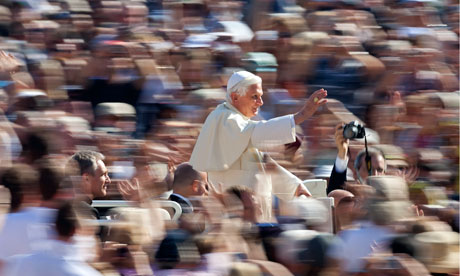
One of Agatha Christie's novels has always caused heart-searching among her devotees. I will not name it, for fear of spoiling the book for that handful in remote jungles who have not read it, but it hinges on the fact that the narrator is actually the murderer. At the moment of murder the narrator simply tells the reader of his presence and the fact that he then left the house. That single sentence nearly resulted in Christie's expulsion from the mystery writers' Detection Club, and its economy with the truth has worried detective fiction purists ever since.
John Julius Norwich has an equally troubling sentence in the opening paragraph of his stylish and enjoyably opinionated history of the popes: "What cannot be denied is that Roman Catholicism began with Christianity itself; all other Christian religions – and there are more than 22,000 of them – are offshoots or deviations from it."
Oh yes? Tell that to the Ebionites, the descendants of the first Christians to gather in Jerusalem – except you can't, because they have long gone. "Offshoots or deviations"? Tell that to the Orthodox; or to Christianity's other surviving pope, the head of the Coptic church; or to the patriarch of the east, Mar Dinkha IV, now a refugee in Chicago from his ancestral Iraq. One might seek the views of his 8th-century predecessor, Mar Timothy, who presided from Baghdad over probably as many Christians as the bishop of Rome – and in a cosmopolitan metropolis whose flourishing state contrasted markedly with the sorry ruins and hovels of the pope's home city.
Norwich is cavalier to these Christians of the east, whom he dismisses as a "half-forgotten sect". The claim of Rome to a uniquely privileged place in Christianity, based on an assiduous chorus of self-promotion since the 4th century, has only looked remotely plausible for half Christian history – this last thousand years. Not until the 20th century, after heroic Roman Catholic missionary efforts throughout the world, did the majority of the world's Christians look to Rome, and to some degree echo Norwich's fatal sentence.
One needs to treat harshly this opening stumble, because Norwich is generally so clear-sighted and balanced. He is judicious about the origins of the church in Rome: we can't be certain that the apostle Peter ever went there – the most we can say is that in the mid-second century, Christians in Rome passionately believed that he had died in their city. Out of their clerical leadership, there emerged (a century and a half after Peter's lifetime) one cleric styled a bishop. That meant revising Rome's Christian past: only in the fourth century did Peter come to be seen not merely as the chief founder of the Christian church in Rome, but also as its first bishop.
None of those developments might have been significant without historical accidents. Islam sidelined Mar Timothy's successors in Baghdad and many ancient churches of the Christian world. Catastrophes for eastern Christianity favoured the ascent of the western, Latin church – once so provincial and unsophisticated. It became the vehicle of our culture, preserving all that remained from the vanished western Roman empire.
Medieval Europe looked to the pope in Rome. Anyone who was anyone spoke the language his church had preserved, Latin. It was an extraordinarily united world. Historically minded western Europeans tend to take the unity of medieval Europe for granted but it is unique in human history for a region to be so dominated by a single form of monotheistic religion and its accompanying culture for a thousand years. Only Saudi Arabia comes close to it, and for a far shorter period. The dominance of the church of the Bishop of Rome was a freak in human experience, albeit a freak with profound consequences today. Its break-up in the 16th-century Reformation was a return to the normality of religious history, not some unexpected or even undesirable accident.
Since the Reformation, the Roman Catholic church has prospered. Its greatest test, the French revolution, left it traumatised and gave it a lastingly difficult relationship with the democracy and liberalism associated with that upheaval, but ultimately the popes gained vastly in moral authority from sufferings nobly endured by Pius VI and Pius VII. The revolutionaries got rid of a great many aristocratic European bishops who had been inclined to patronise the Italian clerics sitting far away in Rome; and later revolutions disposed of Catholic monarchs who might be more a hindrance than a help. It's no coincidence that 20th-century popes were great patrons of a new devotion to Christ the king. They had not promoted this cult when there were a great many worldly kings around.
Few popes have been leading theologians, which may seem strange in bishops who have often claimed to be supreme Christian teachers. Perhaps the most distinguished in the Church's history is the present pope, Benedict, who has chosen to use his talents in a conservative direction; but this old man is capable of surprising us. He must be the first pope in history publicly to muse on the ethical questions posed by rent-boys, though his predecessors on occasion had more private preoccupations with the same theme.
John Julius Norwich entertainingly tours past popes good and not so good, and clearly has an affection for an especially likable pope who had one of the briefest reigns, John Paul I. That's not a bad choice.

